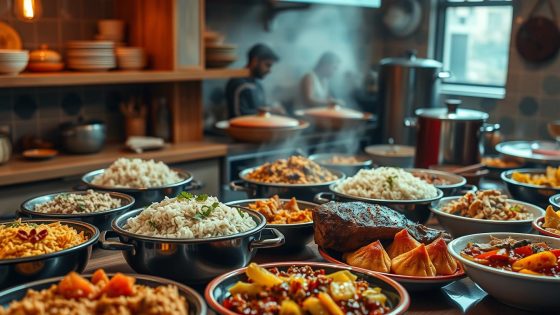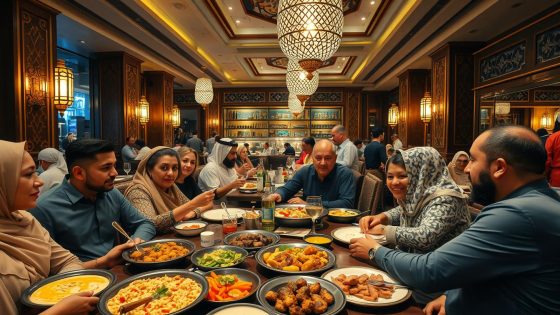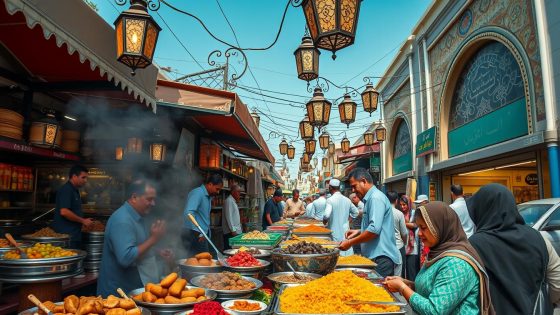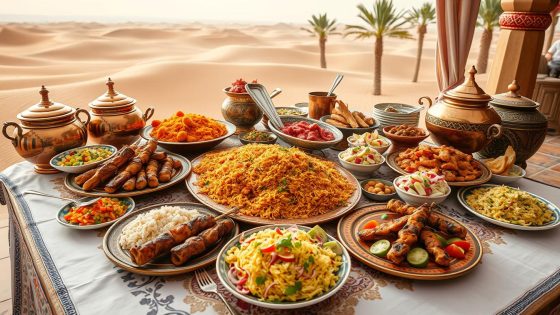Contents
Emirati cuisine is a rich tapestry of flavors, blending Arab and Iranian influences. Cooking these traditional dishes can be tricky for newcomers. Let’s explore common cooking errors and culinary mistakes to sidestep when preparing Emirati specialties.
From makbūs to shawarma, Emirati food offers a world of taste. But beware of mistakes to avoid while cooking Emirati dishes. Using the wrong spice blend or overcooking grains can ruin an otherwise perfect meal. Let’s dive into the do’s and don’ts of this flavorful cuisine.
Did you know that the ideal ratio of fine to coarse semolina in Arabic basbousa is typically around 70-30? This detail highlights the precision required in Emirati cooking. Baking basbousa at 180°C (350°F) and using organic full-fat yogurt can elevate your dish to new heights.
Avoid common cooking mistakes like rushing the process or skipping essential steps. For instance, when making basbousa, start slowly when pouring syrup to prevent oversaturation. These small details can make a big difference in your culinary journey through Emirati cuisine.
Common Errors in Emirati Cooking
Emirati cuisine boasts rich flavors and unique cooking techniques. Yet, many home cooks stumble when trying to recreate these traditional dishes. Let’s explore some common meal preparation errors and offer valuable food prep tips to enhance your Emirati cooking skills.
Using incorrect spice blends
Spices are the heart of Emirati cuisine. A misstep in spice selection can drastically alter a dish’s flavor profile. Chef Dabiz Muñoz, known for his three-Michelin-starred restaurant DiverXO, suggests using chili peppers to elevate any dish. However, balance is key. Overusing or underusing spices like saffron, cardamom, or dried lime can throw off the authentic taste of Emirati dishes.
Overcooking traditional grains
Rice is a staple in Emirati cooking, often flavored with various seasonings. Overcooking can result in mushy, unappetizing grains. To avoid this common cooking error, pay close attention to cooking times and liquid ratios. Proper technique ensures perfectly fluffy rice that complements the main dish.
Skipping essential preparation steps
Rushing through prep work is a frequent mistake in Emirati cooking. Chef Muñoz emphasizes the importance of patience in the kitchen. Skipping crucial steps like marinating meats or properly cleaning and cutting vegetables can significantly impact the final dish. Take time to understand each recipe’s requirements for the best results.
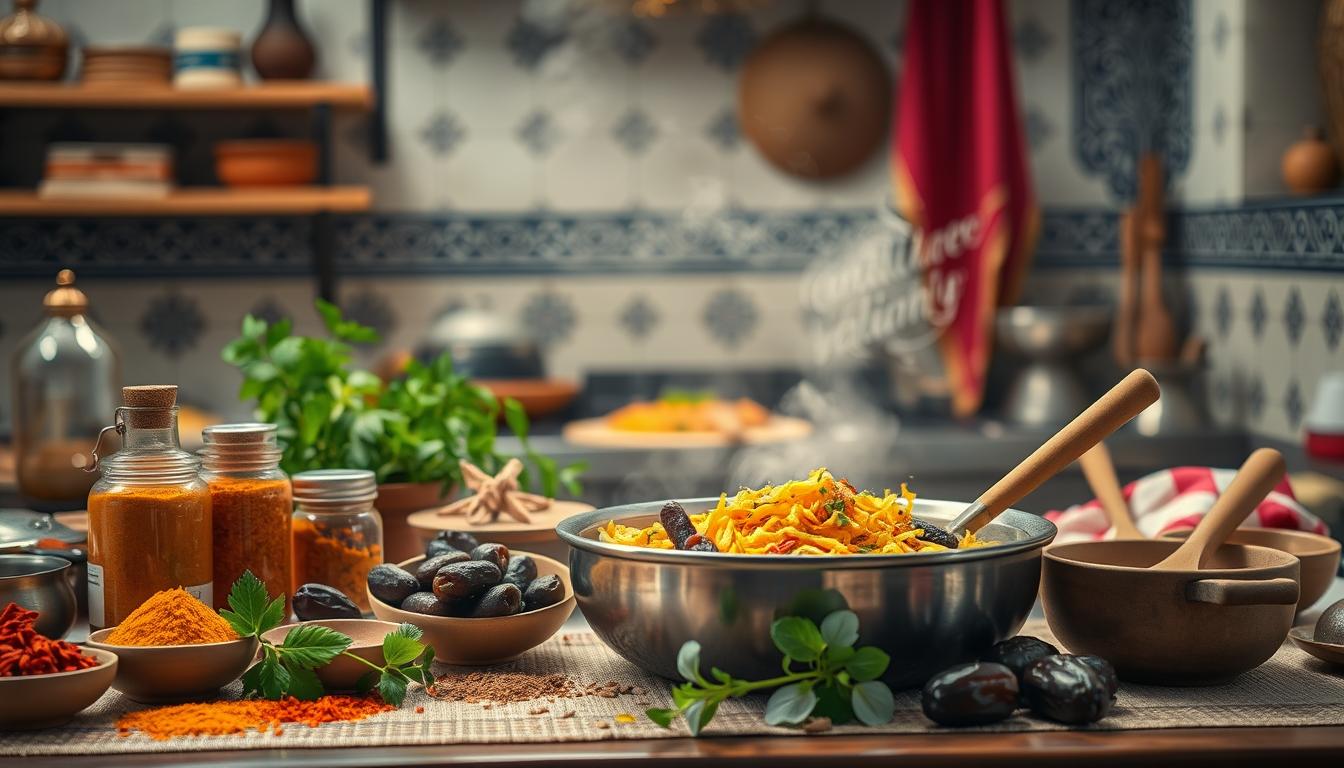
| Common Error | Cooking Advice |
|---|---|
| Incorrect spice usage | Measure spices carefully, taste as you go |
| Overcooked grains | Follow cooking times, monitor liquid absorption |
| Rushed preparation | Plan ahead, allow time for marinating and prep work |
By avoiding these common errors and following expert cooking advice, you’ll be well on your way to mastering Emirati cuisine. Remember, patience and attention to detail are key ingredients in creating authentic and delicious dishes.
Missteps in Authentic Recipes
Cooking Emirati dishes requires attention to detail and respect for traditional methods. Many recipe errors stem from mishandling key ingredients or rushing through important steps. Let’s explore common culinary corrections to enhance your Emirati cooking skills.
Incorrect handling of saffron and cardamom
Saffron and cardamom are prized spices in Emirati cuisine. To extract their full flavor, soak saffron threads in warm water before use. Crush cardamom pods gently to release their aroma. Avoid using pre-ground versions, as they lose potency quickly.
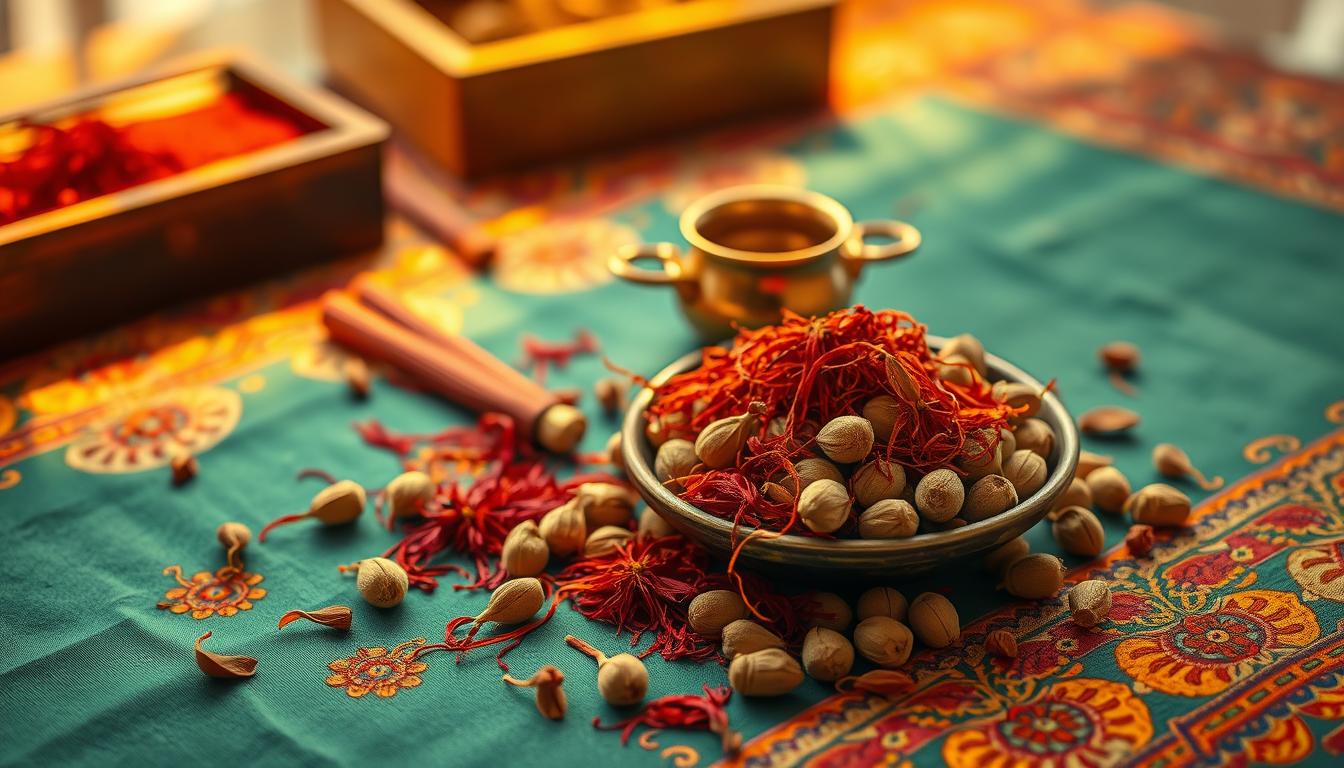
Not following traditional slow-cooking techniques
Slow-cooking is crucial for many Emirati dishes. Rushing this process can result in tough meats and underdeveloped flavors. For example, when making a traditional lamb stew, allow at least 2-3 hours of simmering for tender, flavorful results.
Adding too much modern seasoning
While experimenting is fun, overusing modern seasonings can overpower the authentic taste of Emirati dishes. Stick to traditional spice blends like bezar for best results. Balance is key – enhance natural flavors rather than masking them.
| Common Recipe Error | Culinary Correction |
|---|---|
| Using pre-ground saffron | Soak whole saffron threads in warm water |
| Rushing slow-cooked dishes | Allow 2-3 hours for stews to simmer |
| Overusing modern spices | Stick to traditional Emirati spice blends |
Avoiding Mistakes with Cooking Tools
The right cooking tools play a crucial role in Emirati cuisine. Using suitable pots and pans can make or break your dishes. Let’s explore common kitchen mistakes and proper cooking techniques to elevate your Emirati culinary skills.
Using Unsuitable Pots and Pans
Choosing the wrong cookware is a frequent kitchen mistake. For authentic Emirati dishes, heavy-bottomed pots are essential. They distribute heat evenly, perfect for slow-cooking stews and rice dishes. Lightweight pans can lead to uneven cooking and burnt food.
Failing to Achieve Traditional Textures
Emirati cuisine is known for its unique textures. Using incorrect cooking techniques can result in dishes that lack authenticity. For example, makbūs requires specific cookware and methods to achieve its signature consistency. Mastering these techniques preserves the true essence of Emirati food.
| Dish | Recommended Cookware | Cooking Technique |
|---|---|---|
| Makbūs | Heavy-bottomed pot | Slow-cooking, layering |
| Harees | Clay pot | Long simmering |
| Luqaimat | Deep frying pan | Quick frying |
By avoiding these common kitchen mistakes and employing proper cooking techniques, you can create authentic Emirati dishes that honor tradition and delight the palate. Remember, the right tools and methods are key to capturing the true flavors of this rich cuisine.
Practical Tips for Success
Mastering Emirati dishes requires attention to detail and proper techniques. Let’s explore some practical cooking advice to help you avoid common meal preparation errors and elevate your Emirati cooking skills.
Pre-measuring spices for accuracy
Accurate spice measurements are crucial in Emirati cuisine. Pre-measure your spices before cooking to ensure consistency and balance in your dishes. This simple step can make a significant difference in the final flavor profile, helping you avoid one of the most common Emirati cooking tips mistakes.
Testing flavors before final cooking
Tasting as you cook is essential for perfecting Emirati recipes. Adjust seasonings gradually, allowing flavors to develop. This approach helps prevent over-seasoning and ensures your dish meets traditional taste expectations. Remember, it’s easier to add more spice than to correct an overly seasoned dish.
Ensuring balanced heat distribution
Proper heat distribution is key to successful Emirati cooking. Use heavy-bottomed pots for even heat spread, especially for slow-cooked dishes like Kabuli Pulao. Maintain consistent temperatures to achieve the perfect texture and flavor in your meals. By following these Emirati cooking tips, you’ll be well on your way to creating authentic and delicious dishes.
